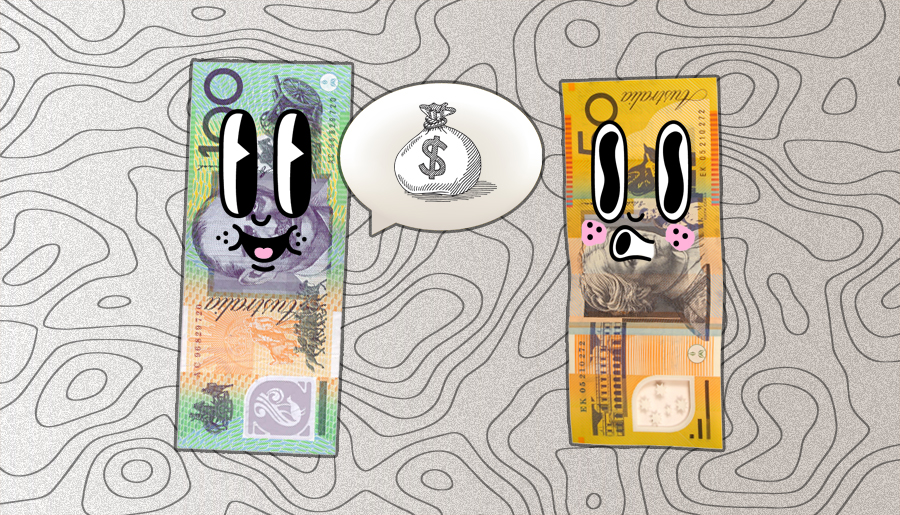The Headlines: The perfect interlude while waiting for your coffee, your kid to tie their shoes, or your cat to one day respect you. And this Tuesday is giving us some buckwild news, so let’s get cracking on with it.
Pay Secrecy Clauses Have Died
If you’ve ever wanted to talk pay rates with a work friend, but were strangled by a pay secrecy clause, you’re now officially free. This is because the Federal Government’s Secure Jobs, Better Pay Bill has outlawed them.
According to Workplace Relations Minister, Tony Burke, pay secrecy clauses can hurt women and create gender pay gaps.
“Banning them will improve transparency and reduce the risk of gender pay discrimination by allowing women to compare their pay with that of their co-workers. Differences can be discussed with their manager without fear of punishment,” said Burke.
The Interest Rate Has Gone Up Again
Inflation is the art of stuff raising in price over time. This typically happens when there’s too much demand and not enough supply. If something’s limited in stock, such as Sydney’s homes, people are incentivised to pay more cash for one, thus inflating the item’s price. If said stuff gets too pricey, then lower-class and middle-class people can’t buy it.
To combat inflation, the Reserve Bank of Australia (RBA) can increase the cash rate that banks pay to borrow from it. That increase is typically passed on by banks to borrowers, increasing the amount homeowners have to pay on their mortgages. If those people have less money, they can’t buy as much stuff and the demand, and price, of that stuff will fall.
At the moment, the price of certain items is too inflated. This has caused the RBA to raise the interest rate by 25 basis points to 3.10%. This is the eighth time in a row that the RBA has raised this rate.
Regarding this situation, the Governor of the RBA, Philip Lowe, said, “Inflation in Australia is too high… Global factors explain much of this high inflation, but strong domestic demand relative to the ability of the economy to meet that demand is also playing a role. Returning inflation to target requires a more sustainable balance between demand and supply.”
Meanwhile, Graham Cooke, Finder’s Head of Consumer Research, broke down what these figures could mean for some folks.
Cooke said, “Aussies with a $500,000 mortgage will be paying almost $900 more per month compared to what they were paying in April. To comfortably afford this you’d need to be earning a minimum income of just over $180,000.”
Moreover, Lowe said that we might not be out of the woods yet: “The Board expects to increase interest rates further over the period ahead, but it is not on a pre-set course.”
Related: What Does the Reserve Bank of Australia Do and Should It Get in the Bin?
Related: More People Than Ever Reckon They’ll Never Own a Home, But Are They Right?
Australia’s Making a Chungus-Sized Telescope
In Western Australia, construction for Earth’s biggest telescope has begun. It will feature 100,000 antennas, be around 74 kilometres wide, and cost $3 billion. This piece of tech will be called the Square Kilometre Array Telescope (SKA).
The Head of SKA Construction Planning, Antony Schinckel, is naturally super excited about this project.
“It became apparent that to look back into the earliest epoch of the universe’s evolution, just after the Big Bang, we simply needed a really big telescope,” said Schinckel.
“This is really a world-class system, and the first time that Australia has really hosted one of these mega-science projects for the international community.”
Do Shark Nets Work?
On December 5, two hammerhead sharks were recorded being on the beach-side of the net at Bondi Beach. This was discovered thanks to the efforts of Drone Shark App’s Founder, Jason Iggleden.
In an Instagram post, Iggleden said, “Sharks inside the #sharknets at #bondibeach this morning. Great to see they diverted the nets safe.”
This post has sparked heaps of people to call for shark nets to be abolished. Moreover, one such person in this sea is Australian Marine Conservation Society’s Dr Leonardo Guida.
“Hammerhead species are threatened in Australian waters,” said Guida.
“Two of the largest, scalloped and great hammerheads, are endangered and are protected species. The fact these two were spotted on the beach-side of the net shows how outdated and ineffective this measure is.”
The NSW Department of Primary Industries, who is responsible for these nets, have defended their existence.
“These beaches are netted by contractors using specially designed meshing nets to reduce the chances of shark encounters,” said a spokesperson.
“The nets do not create a total barrier between swimmers and sharks. They are designed to intercept sharks near meshed beaches, which reduces the chance of a shark interaction.”
From August 2021 until the end of March 2022, 325 non-target species were caught in NSW shark nets. These included 14 critically endangered grey nurse sharks, 16 endangered leatherback turtles, four endangered loggerhead turtles, and 19 vulnerable green turtles.
Read more stories from The Latch and subscribe to our email newsletter.







